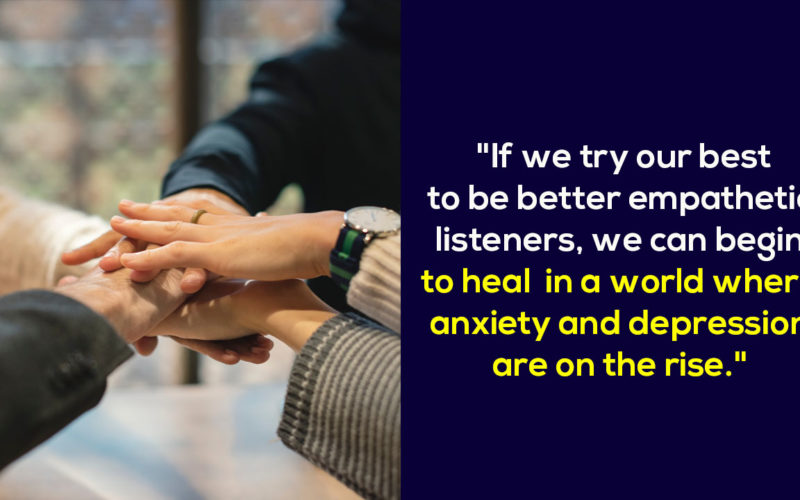Mental health isn’t as tangible as physical health. That’s why a lot of us are incapable of noticing it, let alone understanding it. And since there are a lot of stigmas around depression and anxiety, it’s often shrugged off or the patient is subdued with a heavy dose of sedatives.
With the constant growth in social competition and workplace pressure, people are getting more worked up than they used to. Additionally, as their mental health is getting affected, a need for a much more permanent solution is paramount. And, according to a Facebook user, that very solution can be found in our day-to-day conversations.
In a heartfelt Facebook post, Brenen K Lagmon talked about how he came to know about the problem in our approach towards mental health through two conversations. One, where he was the one expected to give emotional support, and the second, where he was expecting the same.

Yesterday a friend called me for emotional support. She was clearly in an anxious headspace and was dealing with a flurry of emotions. Instantly, I started to respond to her in the way I felt I could help her: giving her advice, sharing my experience, and talking about what she should do. I noticed something: she became quiet. She called me in a state of despair, and instead of learning about why I had commandeered the conversation with all of my well-intentioned insight.
I found myself then making a concerted effort to re-center her and her feelings, and slowly she started to open up and talk through her feelings. By the end, she thanked me for being supportive, and I could tell we had grown closer.
In the same day, I became anxious and reached out to a friend for support. When I started to get advice in return, I remembered how this was something I have encountered many times in my life. I have had many periods of depression, anxiety, and grief, and often found most people were unequipped to be supportive so I would keep my feelings bottled up, further perpetuating cycles of anxious thoughts.
It was then I was inspired to share this list of things that people should and should not do to be supportive. I know no one is perfect, and even I am very guilty of doing things on the do not list. However, if we make it a goal to try our best to be better empathetic listeners and strive to follow things on this list, we can begin to heal in a world where anxiety and depression are on the rise.
By combining these two experiences, Brenen first listed very simple but pragmatic things that we shouldn’t do when somebody approaches us for emotional support.

1. DONT give advice unless they ask for it.
Advice is often very well-intentioned, but it is also often unwarranted. If you jump straight into advising, you may be assuming the person needing support does not already know what you are telling them. Instead of empowering or validating them, you are probably just making them feel as if their feelings are stupid or trivial. If you act like there is some magical cure for feelings of pain and grief, you reinforce the idea that their feelings are the result of them doing something wrong. In reality, they are just their body’s natural reaction to loss, pain, or struggle.
2. DON’T try to find the ‘Silver Lining.’
We often try to think of the Silver lining or the positive thing that we assume the feeler is not seeing. Again, this may be well-intentioned, but it does not ameliorate feelings. Our default to this reaction is based on the conflation of feelings and thoughts: that somehow our way of thinking is shaping our feelings and if we just think more positively the bad emotions will go away. News flash: Feelings and thoughts are separate.
Thinking positively does not erase the pain. If you find yourself starting with, “Hey, well at least….” “Look at it this way!” or “On the Brightside…” you further diminish their feelings of pain, and make them feel lonelier.
3. DON’T Generalize.
Another good meaning thing we commonly do is generalizing the person’s experience. As a listener, it feels like this is the right thing to do: showing a person that their experience is shared should calm their feelings. However, this can sometimes backfire. Generalizing makes the feeler feel as if they do not have sovereignty to their own experience and their own feelings, that their awareness of how unique their pain is might (again)be just a product of bad thinking. Sure, others might have experienced something similar, but knowing that does not make the sufferer’s experience and pain just disappear.
Specifically generalizing the future. Saying, “you will find someone,” or,”you will get better,” is not always true. You may not know the future, and that generalization may create false hope and further circumstances for negative feelings.
4. DON’T make it about you.
When someone comes to you for emotional support, hold off on sharing your stories. You may think that sharing your story will give them insight into how to cope, but not everyone is like you. When you share your story, it can again diminish theirs. I have had people tell me things like,” Well, welcome to the club.” “We have all been there before.” When confronted with my pain. And it makes me feel resentful and not any better. This is another subtle form of dismissiveness.
5. DON’T be judgmental.
One of the least helpful things you can do is judge a person’s thoughts or feelings. One of the most hurtful things for a person who has taken up the courage to share with you is for them to be told, ” you’re just being dramatic.” or” youre just thinking too hard about this.” Saying things like these are just an easy way for you to cop out of actually going through the process of listening. Listening takes effort whereas tagging someone as dramatic is effortless, so we often do this in an attempt to deflect away from meaningful conversation and stay in our own comfortable lane. That doesn’t help anyone but yourself.
6. DON’T do only the bare minimum.
There is a list of unspoken bare minimums out there. Saying “Sorry for your loss” or “My condolences, this too shall pass” is like reading phrases from a script from a book for English learners. There is no heart behind the saying when you hear it from everyone. If you really care about your loved one, push the envelope even further, take that extra step to make that person’s pain feel important.
After listing the things we should avoid, Brenen pointed out the things we should do to help someone suffering from depression or anxiety.

1. DO ask gently probing questions.
This is the best thing you can do: create space for the person to share what they are feeling and experiencing. When you reframe your approach from advice giving to LISTENING, the space for transformation opens up. “What are you missing about them?” “Could you tell me more about your feelings?” “What is it like for you?” This lets the speaker know that it is safe to share their feelings, they do not need to defend them or feel like they are just crazy, but their feelings are real and someone genuinely cares about them.
2. DO be willing to learn
Let go of your generalizations and advice. Instead of thinking like a lecturer, become a student. Pretend that the person you are listening to is actually there to teach you. This makes you receptive to their experience and takes away dismissive behaviors.
3. DO validate their feelings.
Instead of making generalizations about their situation, you can verbally validate what that person is sharing. “Wow, that is really tough.” “I can’t imagine what you are going through.” “ That is seriously so sad.” Statements like those let the feeler know that you see their pain, you acknowledge their struggle, and they are not crazy for feeling crazy emotions. It lets them know that someone knows they are not actually alone, there is someone they can count on.
4. DO be willing to face all of it with them
There is often a sea of many different emotions that underlie pain and grief. Anger, sadness, despair, pain, and even happiness can be involved, making the feeler extremely disoriented. When they begin to share their feelings, they begin to unravel those messy complex emotions. Be willing to give them space to work through everything, don’t shy away or ask them to stop because it makes you uncomfortable. Hold their hand and walk through the shadows with them.
5. DO make a concerted effort to show up.
No one will overcome his or her depression or anxiety in a day or a conversation. If you really care about that person make it a goal to check in on them. Let the conversation be long-standing and continuous. Hold that person’s hand and continue along this journey with them. When you think of them, check in and ask how they are doing. Let them know that you share a proximity to their pain and you are a real resource for emotional support. And as you learn more and more about how to be supportive to them, you will become an even better confidant and ally, and they will learn more about you and one day, when the tables have turned and you need help, they will be there for you too.
We live in a world where social media and adverts are always telling us to be happy in the most unnatural ways possible, like splurging and eating. But that’s not practical. Making solid friends, talking to them, connecting with your parents and doing everything that Brenen is saying is much more effective.




